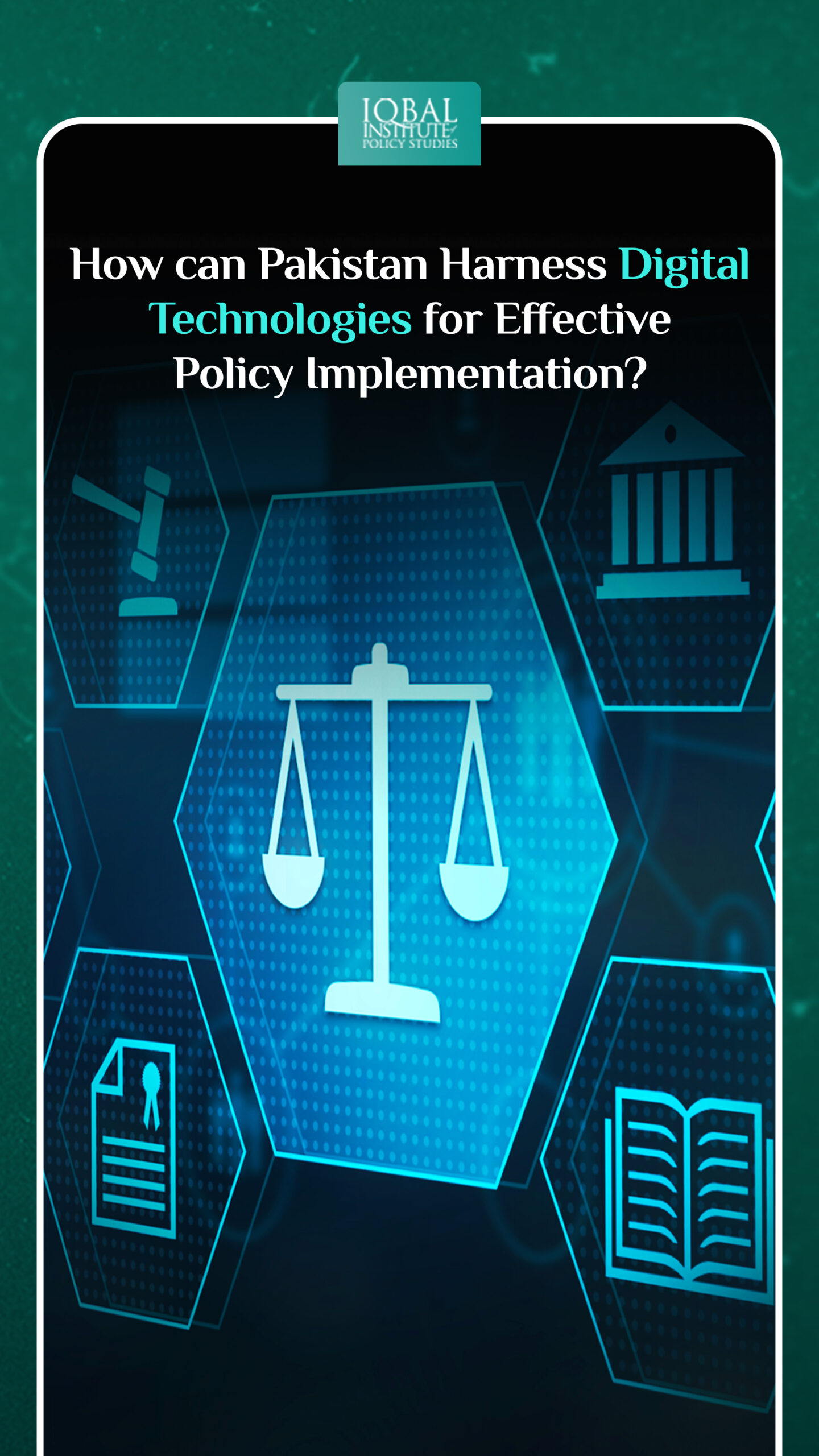No innovation in history has advanced as quickly as digital technologies. These technologies have become potent tools for achieving effective and efficient results, even in the realms of governance and policy execution. They can assist governments in better developing, designing, and enforcing rules and regulations, as well as being more efficient in reducing waste. Since the public sector generates and consumes vast amounts of data, there is a great opportunity for governments to innovate using this data and digital technology. Policymakers on the other hand may promote inclusive decision-making, increase transparency, and streamline procedures by utilising digital solutions. However, creating and executing appropriate regulations for the digital age is a difficult task. Therefore, governments must collaborate with industry experts, develop strong technical knowledge within regulatory agencies and embrace an agile regulatory strategy that allows for flexibility and adaptation as technologies change to gain maximum benefits from these evolving technologies.
Condition of Pakistan
In all other developing nations, including Pakistan, the government frequently develops policies without taking into account its own capacity for implementation. As a result, throughout time, there has been a growing disconnect between policy goals and the actual provision of public goods. The failure of Pakistan’s overall policy is caused by a variety of issues. These include corruption, centralization of the execution process, lack of vision, inadequate financial resources, insufficient or inappropriate budgetary allocations, inept human resources, weak institutional frameworks, and frequent interventions. The policy-making team is the most crucial element. The purpose of sending policymakers abroad is to learn from their experiences. However, a lot of them create policies without properly understanding the distinctions between the circumstances in those nations and the local circumstances.
Furthermore, numerous legislative, legal, strategic, and policy tools have laid the groundwork for Pakistan’s technological and digital underpinnings, which give legal protection, policy guidelines, and assistance to Pakistan’s tech ecosystem. However, model clauses for cross-border transfers of personal data do not exist, trade secrets are not protected by law, nondisclosure agreements are not protected, there are no tax regimes that permit competitive financial instruments that make it attractive to keep money abroad, there are no laws that recognise or regulate blockchain and cryptocurrencies, and the list goes on. Among the 132 economies included in the GIobal Innovation Index 2022, Pakistan comes in at number 87 (World Intellectual Property Organisation, 2022). Since, countries all over the world are becoming more and more dependent on cutting-edge technologies for productivity, efficiency, and reusability and stand a chance of surviving, Pakistan too shall adapt technological tools to maximise the efficiency of its policy formulation and implementation to achieve optimal results.
Ways to Utilise the Maximum Potential of Digital Technologies
Develop a Thorough Digital Policy Framework
Governments can create an extensive digital policy structure outlining the vision, objectives, and methods for harnessing digital technologies in policy implementation. This framework should prioritise digital governance, decisions based on data, public involvement, and the creation of digital infrastructure.
Promote the buildup of resilient digital infrastructure
The government can make investments in the development of data centres, broadband networks, and high-speed internet connectivity. The groundwork for the smooth execution of digital solutions will be laid by this infrastructure, which will also guarantee access for all of the nation’s residents.
Promote Open Data tasks
Governments must encourage open data projects by making government data widely available to the public in a standardised and machine-readable format. This will increase transparency and accountability while also empowering individuals, researchers, and businesses to employ data for effective decision-making and creativity.
Encourage Public-business Partnerships
Effective policy execution requires cooperation between the government and the business sector. Developing countries like Pakistan can create collaborations between the public and private sectors to harness the private sector’s knowledge, resources, and innovation in establishing and implementing digital solutions. These collaborations have the potential to speed the adoption of digital technology while also ensuring long-term and scalable deployments.
Resilience in Cybersecurity Measures
As digital technologies evolve, guaranteeing data security and protection becomes more important. Pakistan should boost cybersecurity measures by developing strong policies, procedures, and technology to protect digital infrastructure, secure critical data, and minimise cyber threats. This will increase trust in digital systems and drive more use.
Improve Digital Literacy and Skills
Pakistan must make investments to improve digital literacy and skills among the population if it is to fully benefit from digital technologies. This includes launching projects, workshops, and training programmes to give residents, elected officials, and policymakers the information and abilities they need to efficiently use digital technologies and platforms.
Pilot and Scale Digital Initiatives
Governments can begin by testing the viability of digital initiatives in a few selected industries or locations to pinpoint problems and improve implementation methods. To ensure greater uptake and impact, successful pilot initiatives can then be expanded and reproduced across the nation.
Citizen Engagement in Policy Implementation
Government can encourage citizen participation in the implementation of policies by utilising digital platforms including social media, internet portals, and mobile applications. These platforms allow for public participation in decision-making processes and are useful for conducting surveys and collecting feedback. The government may guarantee that policies meet citizens’ needs and ambitions by incorporating them into the implementation process, which will increase policy adoption and efficacy.
Enhance Financial Integration and Digital Payments
Financial inclusion and digital payment promotion can have a big impact on policy implementation. The government may lessen corruption, increase the transparency of financial transactions, and make it easier for residents to get subsidies and benefits by supporting the development of digital payment systems and opening up access to financial services. This makes it possible to implement policies in an effective and focused manner while also enabling people and enterprises to engage in the formal economy.
Establish Real-Time Monitoring and Evaluation Systems
Digital technologies facilitate real-time monitoring and evaluation of policy implementation, enabling prompt feedback and modification of course. Governments can track the development of policy efforts, spot bottlenecks, and evaluate their impact on the ground by implementing digital monitoring technologies. This data-driven strategy gives decision-makers accurate and current information, empowering them to make wise decisions, allocate resources effectively, and quickly address implementation issues. Accountability, openness, and general efficacy of policy execution in Pakistan are all improved through real-time monitoring and evaluation systems.
Conclusion
Pakistan has enormous potential to capitalise on the advantages of digital technology, which have emerged as significant tools for successful policy implementation. The nation may improve governance, transparency, and citizen involvement by embracing digital solutions, resulting in more effective and significant policy achievements.
This article is written by Haneen Gul. Haneen is a Research Analyst at the Iqbal Institute of Policy Studies (IIPS).
Reference
World Intellectual Property Organisation. (2022). Global Innovation Index 2022. Retrieved from https://www.wipo.int/edocs/pubdocs/en/wipo_pub_2000_2022/pk.pdf



Leave a Reply